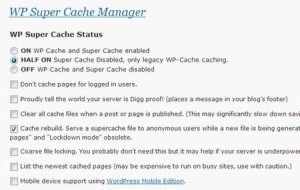WordPress’ success in the personal blogging/CMS software has given rise to a number of plugins, hosting platforms and sub-economies related to hosting and optimizing WordPress. While there is no substitute for running a VPS a dedicated server or cloud hosting for being able to handle and scale with traffic, there are a variety of options for businesses on a budget and theme developers that will assist with speeding up your site.
If you are not a theme developer or you do not know anything about programming there are still things you can do to speed up your site.
Caching
Probably one of the easiest ways to speed your site up is to use caching. WordPress uses a scripting language (PHP) to retrieve information from the database. This means – each time someone loads a page on your site every piece of information that you have entered into the WordPress dashboard (blog name, tagline, widgets, content, etc…) is being requested in succession from the database. If you have a page with 5 posts, 3 widgets and a 2 tiered menu, the themes’ template page is making 10s of individual requests on the database to display your page.
Caching is able to eliminate these requests by capturing and storing a plain-HTML version of the page to present to users when they view it. To use a metaphor – it’s very similar to having a stocked pantry. You would not want to have to go to the market every time you wanted to make a meal, its much easier to go to the pantry and pull out ingredients. Caching stores HTML versions of your pages so they can be served on demand without having to wait for PHP to make the requests to the database.

WP Super Cache is a wonderful plugin for caching WordPress, it has a super easy mode (a couple clicks and your site is now using caching!) as well as more advanced features for power users.
Minifying
While caching really only affects the speed at which scripted/database driven pages are served, the associated parts of the site which add style and interaction (CSS, JavaScript) are not affected. To serve these files quickly we need to compress or reduce the physical size of the files so they are quicker to load.
If you use, manage or run WordPress sites and are not a coder or designers you may have no understanding of CSS and JavaScript or how to simplify these files properly. Enter WP-Minify. WP-Minify uses the Minify Engine to compress files based on Yahoo!’s Rules for Exceptional Performance.
The Minify Engine removes whitespace, combines like terms, removes whitespace and comments and then uses gzip compression to encode them. Its like one of those closet organizers you see on late night TV, only for your files.

Both of these plugins should go a long way towards speeding up your site.
Photo Credit: mashleymorgan
